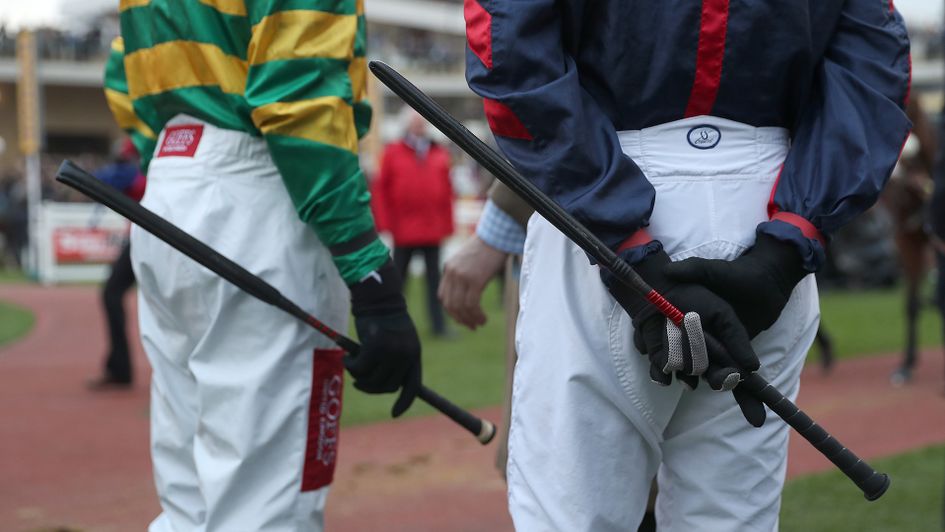John Ingles looks back to an occasion in the past when changes to the whip rules caused a headache for jockeys and racing's authorities alike.
‘A bull in a china shop is a relatively harmless and sure-footed creature compared to the Jockey Club on its crusade against excessive use of the whip.’
Controversy over whip rules, and any changes to them such as those due to be implemented later this month, is nothing new. These days, it’s the British Horseracing Authority, rather than the Jockey Club, which has responsibility for such matters, but substitute ‘the BHA’ for ‘the Jockey Club’ in the above quote, and some in racing - including jockeys such as Sean Quinlan and Harry Cobden who have spoken out about the proposed rule changes in recent days – might feel that not much has changed in the way racing’s authorities have dealt with the contentious issue of the way the whip is used in the course of the last forty years or so.
Timeform had a lengthy say on the matter in the essay on the Sun Alliance Novices’ Hurdle winner Drumlargan – the source of the above quote – in the 1979/80 Chasers & Hurdlers annual. Drumlargan’s jockey, Tommy Ryan, and fellow Irish rider, Joe (‘JP’) Byrne both fell foul at the Cheltenham Festival that season of a more stringent approach by the Jockey Club to misuse of the whip. In January 1980, the Jockey Club had instructed local stewards ‘to exercise fully their powers…in all cases of excessive use of the whip.’
Beyond that instruction, no formal guidelines were issued to either stewards – and, just as importantly, to the jockeys themselves – about what exactly constituted ‘excessive use’. At least the proposed current changes, whether jockeys are happy with them or not, make that much more explicit by stating the number of strokes permitted, for example. Back in 1980, though, the rather vague notion of excessive use begged the question of whether that was from a horse’s standpoint, the sensibilities of the viewing public, those of the stewards, or those of Press campaigners.
The last-named group were headed by Peter O’Sullevan as racing correspondent for the Daily Express. As O’Sullevan recounted in a chapter of his autobiography Calling The Horses - entitled ‘Excessive Use’ - he’d written an article in his paper’s column in late 1979 advocating much stricter regulations regarding the whip, having become increasingly concerned over its misuse and having recently returned from a race meeting in Sweden where stringent whip rules were already in place.
O’Sullevan received what he called ‘an avalanche of mail’ from readers in support of his article and sent a selection of the letters to the Jockey Club which directly led to their new directive being issued. This gave stewards the power to fine jockeys up to £325 or suspend them for ten days, or both, if they were deemed guilty of excessive use of the whip and therefore improper riding.
In practice however, between the issuing of the instruction in January and the Cheltenham Festival two months later, only a dozen stewards’ inquiries into possible misuse of the whip took place and in only three cases was a fine imposed, none of them exceeding £50.
The crackdown by the Cheltenham stewards therefore came somewhat out of the blue. Six riders were called to account in all, though three of those were given no more than a caution. The third jockey to be fined, in addition to the two Irishmen, was Andy Turnell, ironically known for being the most stylish rider of the era, over his use of the whip on Hill of Slane, a staying-on third in the Triumph Hurdle. Turnell found himself in further trouble for the same reason when finishing second on the same horse at Aintree though was later exonerated by the Stewards of the Jockey Club.
But it was Ryan and Byrne who bore the brunt of the stricter approach, both of them being effectively banned from the saddle for three months after the Cheltenham stewards had referred their cases to the Disciplinary Committee of the Jockey Club. Byrne, Ireland’s champion jockey in 1979, who had already been fined £50 for excessive use of the whip by the Haydock stewards earlier in March, was reported to the Jockey Club over his riding of Batista who was beaten a short head in the Triumph Hurdle.
As for Ryan, he had already incurred the wrath of the Cheltenham stewards before riding Drumlargan. On the first day of the Festival, he’d won the Stayers’ Hurdle on Mountrivers under hard riding which prompted the stewards to issue a £50 fine after asking the veterinary officer to examine the horse. The following day, Ryan’s mount Drumlargan started a hot favourite for the Sun Alliance. Having looked the winner coming to the last, the combination of a bad mistake there and then ducking on the run-in towards the chute that leads from the paddock to the track resulted in Ryan breaching the guidelines again in his efforts to get Drumlargan home by two lengths and he too was reported to Portman Square to face the Disciplinary Committee.
‘We got the impression that what upset some of the critics at Cheltenham was primarily the clumsy, ungainly style of the two Irish jockeys’ commented Timeform in Drumlargan’s essay. ‘Had they delivered similar treatment to their mounts in a polished manner we doubt whether there would have been half the fuss.’
The jockeys’ critics in the Press certainly didn’t mince their words. Brough Scott in the Sunday Times wrote that ‘their heavy-handed methods offended anyone who hates seeing a racehorse treated like some wretched Spanish donkey late for market’ while John Oaksey in the Daily Telegraph called their riding ‘a disgrace to an honourable profession.’ Monty Court went further in the Sunday Mirror, referring to Ryan’s ‘artless brutality’ in his handling of Drumlargan.
Given that the two jockeys concerned were Irish, O’Sullevan referred to the accusations of prejudice which fuelled the resulting controversy. But on the morning after Drumlargan’s race he also reported that his Irish colleagues in the press room expressed the hope that the stewards in their country would take their lead from the Jockey Club in adopting a stronger position on the whip, something the Turf Club duly did when issuing similar guidelines the following January.
Whilst acknowledging that ‘few would claim that either Byrne or Ryan are among jumping’s most stylish riders’ and describing Ryan as being ‘undoubtedly very severe’ on his two winners, Timeform saved most of its criticism for the authorities. Firstly, it contrasted the ‘extremely severe’ punishments meted out to the pair for whip offences with the much lesser penalties reserved in the course of the season for riders found guilty of careless or even reckless riding, implying that safety was deemed the less important issue. ‘A strange sense of priorities!’ remarked Timeform.
Secondly, there were the concerns among jockeys and trainers that the line between trying too hard and not trying hard enough was becoming too thin. O’Sullevan reported that Ryan himself had referred to this dilemma, having recently been taken to task by Irish officials for being too easy on a horse. The jockey’s comment after his ride on Drumlargan that ‘with the money our lads had on this one I should have been lynched if we’d got beat’ wasn’t perhaps the most tactful in the circumstances, but it got to the heart of the matter in that a jockey has obligations to the connections he’s riding for, not to mention those who have backed the horse to win.
Thirdly, there was the clumsy way that the Jockey Club had handled the whole saga. A meeting took place at Newmarket’s Craven meeting involving representatives of jockeys, trainers and the Disciplinary Committee, one which should, of course, have taken place months earlier when the Jockey Club set out on its ‘crusade’ as Timeform referred to it.
The jockeys and trainers were reportedly told that it was felt impractical to lay down hard and fast rules on the use of the whip, though the Jockey Club evidently had a rethink because in June, four and a half months after the original instructions to local stewards, it published a set of guidelines in the Racing Calendar. They may well have been right the first time, however, given that consistent and watertight rules governing use of the whip that satisfy all parties are a thorny issue – as racing’s current administrators are still finding over forty years later!
It is to be hoped, however, that some lessons have been learned from the past and that the latest changes to the rules won’t mean that the whip once again becomes at the centre of another storm at the Cheltenham Festival which is now just weeks away. The modern cushioned whip is a very different instrument to the one which was liable to leave its mark if misused by jockeys back in 1980 but, by the same token, what has also changed since then is that the viewing public is even less thick-skinned nowadays in terms of its sensibilities on the issue.
Article first published 02/02/23
More from Sporting Life
- Racecards
- Fast results
- Full results and free video replays
- Horse racing news
- Horse racing tips
- Horse racing features
- Download our free iOS and Android app
- Football and other sports tips
- Podcasts and video content
Safer gambling
We are committed in our support of safer gambling. Recommended bets are advised to over-18s and we strongly encourage readers to wager only what they can afford to lose.
If you are concerned about your gambling, please call the National Gambling Helpline / GamCare on 0808 8020 133.
Further support and information can be found at begambleaware.org and gamblingtherapy.org.












